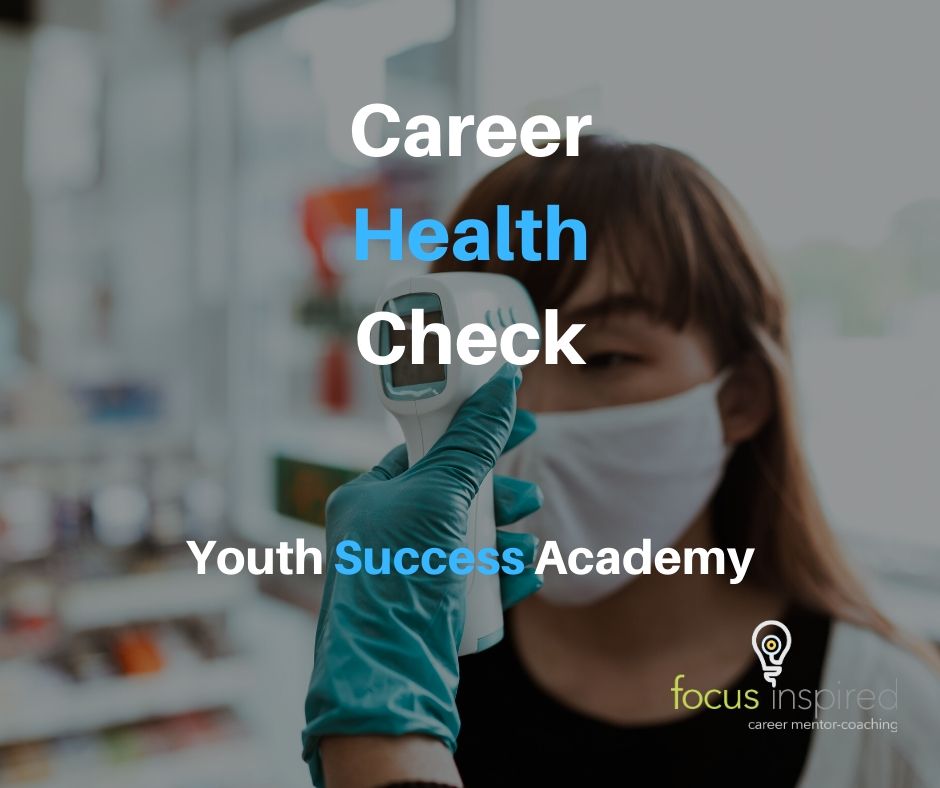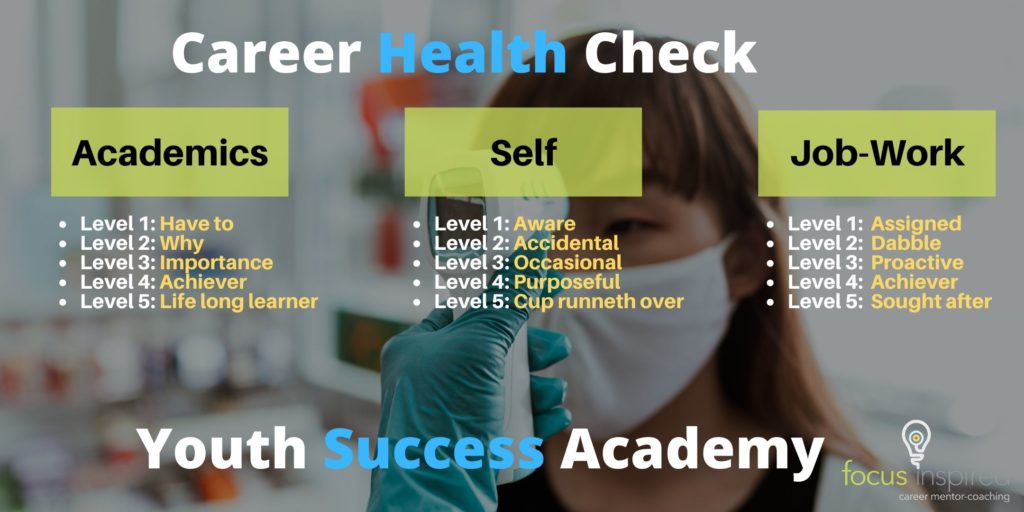
Career Health Check – Student edition | Youth Success Academy CHC YSA

How is your career health? Think about it for a minute. You are recommended to visit your doctor for an annual check-up for your physical health. How about your career health? What is Career Health for that matter? I’m focussed on the career success of the youth demographic, and I put together that Youth Success Academy (YSA) as I started pondering these questions. The youth success academy has three pillars: academics, job – work, self. If we were to take these three pillars could we put together some sort of evaluation of “health”? Sure.
In consulting we have a concept of a “maturity model” and I thought to adapt that concept using the three pillars of the YSA.
This is done in the context of someone who is still in school (we will get to another one where academics will be replaced by another focus, and it would still be helpful for you to evaluate yourself on the JOB-WORK and SELF pillars anyways).
Academics
As I begin to reflect on students and their attitude towards academics, two major areas stood out:
- Ease, enjoyment and motivation
- Some students found learning easy (they could pick up content With a relatively low amount of effort), enjoyable (whether it required a lot of effort or not, it was fun for them), or we are motivated to do so (sometimes based on internal reasons or sometimes external – i.e. encouragement or expectations from parents and family)
- Understanding, application and value
- Ease, enjoyment or motivation often came from an understanding of the material, how the material could be used in the future and the value that the learning would have for them later on in life. It’s a bit of “chicken and egg” (what is the learning easy for them because they understood it so well? Or did they understand it so it made it enjoyable?
Above all else, these seem to be the differentiators between students who were more or less successful in their school academics. Interestingly, you can roughly see their relation between 7 habits for highly effective people (Stephen Covey) and for high-performance habits (Brendan Bouchard).
Levels:
If you were to score yourself from an academic point of view on a scale from 1 to 5 based on these aspects how would you rate yourself? Could these have a strong correlation to your GPA?
- Level 0: I don’t have access to formal education
- Not necessarily a first world problem and still a consideration as not everyone is as well off
- Level 1: I feel I “have to” go to school
- I don’t particularly understand why and don’t particularly enjoy it
- Level 2: I know why I have to go to school
- I somewhat understand why and might somewhat enjoy it
- Level 3: I value the learning from school and know it is important for me
- I understand the value of school and continue to do it whether I like it or not
- Level 4: I am a high achiever
- School is relatively easy or enjoyable or I’m motivated to get through it, or I understand its value and I’m willing to put in the extra work to gain the results I’m looking for
- Level 5: I am a lifelong learner
- I find learning easy and enjoyable and proactively seek out more learning opportunities
Now if you were to reflect on your current (or former) experience at school, where would you rank yourself? In the younger years, it might’ve been a different value than in later years. You could’ve been one of those students that didn’t value education at first then understood how it could help you later on. Or you could be on the opposite side where you thought school was great early on, then failed to see the value it provided. Or you could’ve been consistent throughout either on the high or low scale.
Academics has been shown not to necessarily correlate to work success. Given that school takes up the bulk of the time of my students, it’s really how that balance of time is used that would be the differentiator.
Job-Work
The main reason to go to school is to get a nice fancy diploma with an even more impressive gold embossed sticker. Right? Definitely not. It should be to gain a lot of learning and understanding. Why? Presumably to prep yourself for a life in the real world. AKA getting a job. Unfortunately, many institutions are focussed on the research of which learning is important but Job readiness is more of an afterthought. Co-op programs, internships, work-integrated learning are all helping institutes move in the right direction. So there’s still quite a ways to go.
As a result, academic success PLUS doing things related to your future job and work is another aspect of overall career success. As I reflect on students and their attitude towards job-work in the following areas come to mind:
- Experience and Professionalism
- Turning theoretical knowledge to practical knowledge. Could be through co-op, internship, work-integrated learning experience. Or extracurriculars, volunteering or personal projects. This allows you to have something to even write about on your resume. And presumably your professionalism helped you make the most of your experiences.
- Interview skills
- While you would hope that experience is enough, interviews are a part of the hiring process that is still in place. You need to be able to act the part and present yourself in the best possible way. Whether you’re actually good at your job or not.
- Networking and relationships
- Relationships that were built into meaningful connections over time are often a bigger predictor of success than academics or experience alone.
These are the typical activities that are undertaken when on the job hunt. Resumes require experience before they are written. Interviews require practice, so hopefully, the experience of doing the work has helped you be able to communicate it more easily. and you’ll find out it’s less about what you know, and more about who you know. And furthermore more about who knows you, and who you know.
Levels:
If you were to score yourself from a job-work point of view on a scale from 1 to 5 based on these aspects what would you give yourself?
- Level 0: I don’t focus on work at all
- My resume will consist of my schoolwork alone
- Level 1: I do the work assigned to me
- I rely on my school and program to provide me with a relevant work experience
- Level 2: I dabble in part-time work, volunteering or some sort of extracurriculars
- I somewhat understand why and might somewhat enjoy it
- Level 3: I proactively seek out experience, be it in the form of volunteering, part-time jobs and other extracurriculars
- I understand that school will not be enough to get me a job and I’m taking the necessary steps to gain additional experience
- Level 4: I am a high achiever
- School is necessary and will put in the work to do as best I can, while prioritizing demonstrated work experience and professional relationships
- Level 5: I am a sought after work asset
- Companies and organizations are proactively seeking me out to hire me and add value to their organization
Now reflect on your current school experience, adding the context of job-work, where would you rank yourself?
Now just because you do well in school and have prepared yourself for work, that doesn’t mean you’ll have a for filling life. You’ll need to take care of yourself before that happens.
Self
Airlines advise that in case of an emergency, put your oxygen mask on before helping others. That advice could be beneficial in carrying it through other parts of our life. Before excelling at academics or job-work, how about taking care of yourself first?
Taking care of yourself allows for sustained success. As I reflect on student success, the following areas come to mind:
- Physical health: Nutrition, exercise, sleeping – all are extremely important and if you’re not taking care of your body then everything else becomes more challenging
- Mental health: there’s a saying that the body follows the mind, so if you don’t take care of your mental wellness then your physical health can be challenged as well. Plus it makes taking tests and everyday activities much more difficult as well
- Financial health: Wow some students are subsidized by their parents, many have to earn a living through school which becomes another aspect to be addressed
- Family dynamics: while all of these previous elements of nurture need to be addressed, the element of nature also has to be accounted for. Especially since some of the nurture comes from that family nature.
- Social dynamics: You are the average of the five people you spend the most time with. If that’s your family then we move into family dynamics, if it’s not then we need to look at social dynamics.
With an overarching theme of understanding their purpose.
Levels
As there are more elements to yourself then the levels are more nuanced due to the interrelated nature of everything. A simplified level the following are my observations:
- Level 0: I don’t purposefully take care of myself at all
- Whatever happens, happens
- Level 1: I know about taking care of myself and cannot prioritize the time
- I might accidentally do things to take care of myself, and self-care is not purposeful
- Level 2: I occasionally make time to take care of myself, and it’s not consistent
- I somewhat understand why self-care is important
- Level 3: I consistently and proactively take time to take care of myself
- I accept that self-care is important and am taking steps to make it a part of my life
- Level 4: I am a high achiever
- I prioritize self-care even when not necessarily convenient as I’m focused on sustained, healthy, happy and purposeful living
- Level 5: “My cup runneth over”
- I take care of myself so well that I am able to amply take care of others around me
Summary
Keep in mind that these are snapshots and at a given moment in time. The great thing is that you can always adjust your level as you see fit. Knowing the habits and tendencies that are needed to get to the next level will help you through your career journey. Also, understand that Level 5 might not be the appropriate level for you at this point in time.
Though if you feel like there’s more to life, then take some purposeful steps and allocate time to progress up to the level that you feel is appropriate to you. And know that all of them are a constant and consistent practice. Once you attain a level, then an effort is often required to stay at that level. We’ll be sharing more resources in the future on how to advance and improve on each level. At the end of the day, take the knowledge and make a conscious choice of where you are. Knowledge is only potential power and only becomes power when turned into action.
Footnotes:
Levels adapted from SMMM™ (strategic management maturity model) and the commitment curve from change management
- Level 1: ad-hoc static & awareness
- Level 2: reactivity & understanding
- Level 3: structured and proactive & acceptance
- Level 4: managed and focused & adoption
- Level 5: continuous improvement & ownership
Also published on Medium.
Follow:Share: